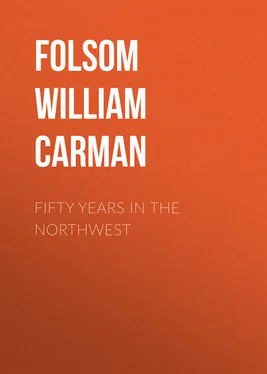William Folsom - Fifty Years In The Northwest
Здесь есть возможность читать онлайн «William Folsom - Fifty Years In The Northwest» — ознакомительный отрывок электронной книги совершенно бесплатно, а после прочтения отрывка купить полную версию. В некоторых случаях можно слушать аудио, скачать через торрент в формате fb2 и присутствует краткое содержание. Жанр: История, foreign_antique, foreign_prose, на английском языке. Описание произведения, (предисловие) а так же отзывы посетителей доступны на портале библиотеки ЛибКат.
- Название:Fifty Years In The Northwest
- Автор:
- Жанр:
- Год:неизвестен
- ISBN:нет данных
- Рейтинг книги:3 / 5. Голосов: 1
-
Избранное:Добавить в избранное
- Отзывы:
-
Ваша оценка:
- 60
- 1
- 2
- 3
- 4
- 5
Fifty Years In The Northwest: краткое содержание, описание и аннотация
Предлагаем к чтению аннотацию, описание, краткое содержание или предисловие (зависит от того, что написал сам автор книги «Fifty Years In The Northwest»). Если вы не нашли необходимую информацию о книге — напишите в комментариях, мы постараемся отыскать её.
Fifty Years In The Northwest — читать онлайн ознакомительный отрывок
Ниже представлен текст книги, разбитый по страницам. Система сохранения места последней прочитанной страницы, позволяет с удобством читать онлайн бесплатно книгу «Fifty Years In The Northwest», без необходимости каждый раз заново искать на чём Вы остановились. Поставьте закладку, и сможете в любой момент перейти на страницу, на которой закончили чтение.
Интервал:
Закладка:
While we were gazing on the magnificent scene, musing upon its varied beauties and recalling its historical associations, the sun set, and reluctantly we set out on our return, a descent the more perilous because it was growing dark. Extreme caution was necessary; nevertheless we made good headway, as we found ourselves sometimes sliding and even rolling down the path that we had ascended with so much difficulty in the forenoon. It was long after nightfall that, tired and hungry, we reached Wyman's hotel on the banks of Dead river.
Lumbering in Maine. – The practical lumberman did not usually start his teams for the pineries until snowfall and the freezing of the lakes and rivers. The first thing was to select a place for operations. This was done in the open season. When the winter had fairly set in the lumberman, with his ox teams, generally six oxen to a sled, the sleds laden with camp plunder, would start for the pineries. The slow ox teams would consume many days making the journey. The crew of men employed for the winter generally met the teams in camp. The snow would be cleared away for the camp, and a fire built. The cook would prepare a supper of fried pork, fritters or pancakes, tea, syrup and New England apple sauce, the crew meanwhile cutting boughs, wood, etc., and preparing for permanent camp. Supper over, the cattle were tied to trees and fed. Water was secured for evening use only. A glowing fire would be kept up, around which the crew would gather to spend the evening in talking over the adventures of the day, discussing plans for the morrow or singing camp songs. Thus the evening would pass merrily and swiftly. At the hour for retiring parties of two would spread their blankets on a couch of fir or cedar boughs, and lie down to rest. Next morning the cook would rise at four o'clock to prepare breakfast, which over, as soon as it was light enough the crew would commence the work of the day. Every man goes to his assigned duties, the boss in charge having the general oversight.
The life of a lumberman is one of exposure to the elements, yet it is not necessarily unfriendly to the development of character. With a well ordered camp and gentlemanly crew the winter may pass away pleasantly, and the young man engaged in the comparatively hard toil of the camp, may, with books and papers and cheerful converse with the more thoughtful of his elders, improve the long evenings spent around the camp fire. Many a Maine boy has received here the greater part of his training for the duties of after life.
Sunday was usually occupied in reading, singing, and doing some of the lighter work of camp, such as repairing sleds, shoeing oxen and making axe helves or visiting neighboring camps. It was a day of rest only so far as the heavier work of the camp was suspended. Sanctuary privileges there were none. The work would often close in the sunny days of March. The men would mostly depart for home. A few would remain to drive the logs with the first water from the melting of the snows late in April.
Driving logs in the rapid waters of Maine is hazardous work. Scarcely a day passes without imminent risk to life and limb of the hardy and venturesome men engaged in the work of breaking log landings and jams, and running boats. Men are exposed to wet and cold from dawn till dark. This work requires active and vigorous men, constitutionally fitted and carefully trained to the work. They are usually sociable, lively and wide awake, these qualities enabling them to endure, and even to enjoy, the life of hardship which they lead, and to which they become so accustomed that they are unwilling to leave it until worn out by its inevitable hardship.
CHAPTER I
Going West. – In June, 1836, I again visited the Penobscot in quest of employment, in which I was unsuccessful. At Stillwater, above Bangor, I met my kind friend Simeon Goodrich, also out of employment. After mature deliberation we concluded to go West. Returning to Bloomfield, I collected the money held for me by Capt. Ruel Weston and was soon in readiness for the journey. But a few days before the time agreed upon for leaving, I received a letter from Simeon Goodrich, which contained the unpleasant information that he could not collect the amount due him and could not go with me. Truly this was a disappointment. I was obliged to set out alone, no light undertaking at that early day, for as yet there were no long lines of railroad between Maine and the Mississippi river. The day at last arrived for me to start. My companions and acquaintances chaffed me as to the perils of the journey before me. My mother gave me her parting words, "William, always respect yourself in order to be respected." These words, accompanied with her farewell kiss, were long remembered, and, I doubt not, often kept me from evil associations.
The stage took us directly to the steamboat at Gardiner. The steam was up and the boat was soon under way. It was the New England, the first boat of the kind I had ever seen. I felt strangely unfamiliar with the ways of the traveling world, but observed what others did, and asked no questions, and so fancied that my ignorance of traveling customs would not be exposed. It was sunset as we floated out into the wide expanse of the Atlantic. The western horizon was tinged with fiery hues, the shores grew fainter and receded from view and the eye could rest at last only upon the watery expanse. All things seemed new and strange. Next morning a heavy fog hung over the scene. The vessel was at anchor in Boston harbor and we were soon on shore and threading the crooked streets of the capital of Massachusetts. I was not lost in the wilderness maze of streets, as I had feared I should be, but on leaving Boston on the evening train I took the wrong car and found myself uncomfortably situated in a second or third class car, crowded and reeking with vile odors, from which the conductor rescued me, taking me to the pleasant and elegant car to which my first class ticket entitled me. On arriving at Providence I followed the crowd to the landing and embarked on the steamer President for New York, in which city we remained a day, stopping at the City Hotel on Broadway. I was greatly impressed with the beauty of part of the city, and the desolate appearance of the Burnt District, concerning the burning of which we had read in our winter camp. I was not a little puzzled with the arrangement of the hotel tables and the printed bills of fare, but closely watched the deportment of others and came through without any serious or mortifying blunder. Next morning I left New York on the steamer Robert L. Stevens for Albany, and on the evening of the same day went to Schenectady by railroad. Some of the way cars were hauled by horses up hills and inclined planes. There were then only three short lines of railroad in the United States, and I had traveled on two of them. At Schenectady I took passage on a canal boat to Buffalo. I had read about "De Witt Clinton's Ditch," and now greatly enjoyed the slow but safe passage it afforded, and the rich prospect of cities, villages and cultivated fields through which we passed. At Buffalo we remained but one day. We there exchanged eastern paper for western, the former not being current in localities further west. At Buffalo I caught my first glimpse of Lake Erie. I stood upon a projecting pier and recalled, in imagination, the brave Commodore Perry, gallantly defending his country's flag in one of the most brilliant engagements of the war, the fame whereof had long been familiar to the whole country and the thrilling incidents of which were the theme of story and song even in the wilderness camps of Maine.
The steamer Oliver Newberry bore me from Buffalo to Detroit. From Detroit to Mt. Clemens, Michigan, I went by stage and stopped at the last named place until October 14th, when, being satisfied that the climate was unhealthy, fever and ague being very prevalent, I returned to Detroit, and on the fifteenth of the same month took passage on the brig Indiana, as steamers had quit running for the season. The brig was aground two days and nights on the St. Clair flats. A south wind gave us a splendid sail up the Detroit river into Lake Huron. We landed for a short time at Fort Gratiot, at the outlet of the lake, just as the sun was setting. The fort was built of stone, and presented an impressive appearance. The gaily uniformed officers, the blue-coated soldiers, moving with the precision of machines, the whole scene – the fort, the waving flags, the movement of the troops seen in the mellow sunset light – was impressive to one who had never looked upon the like before. A favorable breeze springing up, we sped gaily out into the blue Lake Huron. At Saginaw bay the pleasant part of the voyage ended. The weather became rough. A strong gale blew from the bay outward, and baffled all the captain's skill in making the proper direction. Profane beyond degree was Capt. McKenzie, but his free-flowing curses availed him nothing. The brig at one time was so nearly capsized that her deck load had rolled to one side and held her in an inclined position. The captain ordered most of the deck load, which consisted chiefly of Chicago liquors, thrown overboard. Unfortunately, several barrels were saved, two of which stood on deck, with open heads. This liquor was free to all. The vessel, lightened of a great part of her load, no longer careened, but stood steady against the waves and before the wind. It is a pity that the same could not be said of captain, crew and passengers, who henceforth did the careening. They dipped the liquor up in pails and drank it out of handled dippers. They got ingloriously drunk; they rolled unsteadily across the deck; they quarreled, they fought, they behaved like Bedlamites, and how near shipwreck was the goodly brig from that day's drunken debauch on Chicago free liquor will never be known. The vessel toiled, the men were incapacitated for work, but notwithstanding the tempest of profanity and the high winds, the wrangling of crew and captain, we at last passed Saginaw bay. The winds were more favorable. Thence to Mackinaw the sky was clear and bright, the air cold. The night before reaching Mackinaw an unusual disturbance occurred above resulting from the abundance of free liquor. The cook, being drunk, had not provided the usual midnight supper for the sailors. The key of the caboose was lost; the caboose was broken open, and the mate in the morning was emulating the captain in the use of profane words. The negro cook answered in the same style, being as drunk as his superior. This cook was a stout, well built man, with a forbidding countenance and, at his best, when sober, was a saucy, ill-natured and impertinent fellow. When threat after threat had been hurled back and forth, the negro jumped at the mate and knocked him down. The sailors, as by a common impetus, seized the negro, bound him tightly and lashed him to a capstan. On searching him they found two loaded pistols. These the mate placed close to each ear of the bound man, and fired them off. They next whipped him on the naked back with a rope. His trunk was then examined and several parcels of poison were found. Another whipping was administered, and this time the shrieks and groans of the victim were piteous. Before he had not even winced. The monster had prepared himself to deal death alike to crew and passengers, and we all felt a great sense of relief when Capt. McKenzie delivered him to the authorities at Mackinaw.
Читать дальшеИнтервал:
Закладка:
Похожие книги на «Fifty Years In The Northwest»
Представляем Вашему вниманию похожие книги на «Fifty Years In The Northwest» списком для выбора. Мы отобрали схожую по названию и смыслу литературу в надежде предоставить читателям больше вариантов отыскать новые, интересные, ещё непрочитанные произведения.
Обсуждение, отзывы о книге «Fifty Years In The Northwest» и просто собственные мнения читателей. Оставьте ваши комментарии, напишите, что Вы думаете о произведении, его смысле или главных героях. Укажите что конкретно понравилось, а что нет, и почему Вы так считаете.












